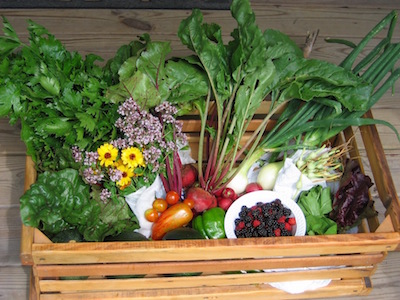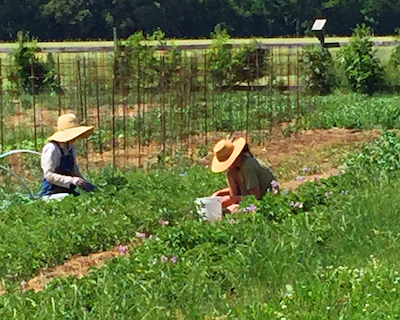ALTERNATIVE TABLE
A Visit to the Upshurs’ Copper Cricket Farm

Late June basket from Copper Cricket Farm. (Photos: Karen Gay)
By KAREN GAY
Cape Charles Wave
June 8, 2015
Small sustainable farms are on the rise in America and even on the Eastern Shore. Every time I go visit a new farm on the Shore the farmers point me to yet another farm I haven’t heard about. As part of my Weston A. Price Chapter Leader responsibilities I have compiled a list of great places to get fresh, local and often organic food. As this list is growing, my goal is to visit each farm or market on the list so that I can explain to readers the hallmarks of each one. I will be happy to email the resource list to you ([email protected]) or you can pick one up at the Tall Ships Festival where I will have a Weston A. Price booth.
Surprisingly, I have found that some of the farmers I’ve visited have started their farms in mid-life. This is the case with the farmers of Copper Cricket Farm, Carol and Arthur “Cricket” Upshur. Cricket was raised on the Shore and graduated from Broadwater Academy. He met Carol in college and they raised their three children while moving frequently. Cricket spent much of his career working at Groupe Danone, a large French food company. It was probably their time in France that crystalized their views on good food and natural food products.
CONTINUED FROM FIRST PAGE
Eventually the stress of traveling all of the time for work led Cricket to decide to quit his job in 2007 and begin to live life as a farmer on the Shore. At the time, Carol was a middle school math teacher in Connecticut and loved her job. She continued to work for another two years while Cricket, with the help of many friends and neighbors, including a partner couple, Bob and Melody Copper, prepared the infrastructure for the farm.
In 1994 they bought their home on the Shore, later purchasing the land that contains the eight acre plot that the current operation occupies. The farm is just down a country road from where Cricket grew up.
Copper Cricket Farm is primarily a Community Supported Agriculture (CSA) that provides a variety of vegetables, cut flowers, honey, eggs, and a variety of farm products to over 100 families. Their philosophy is to minimize off-farm inputs by growing their own mulching hay which they use for weed suppression, a sheet composting system. There are several variant methods of sheet composting which involve adding organic matter to soil. They avoid plastic mulches because of their concern for soil life and natural soil processes. They largely use a completely no-till approach to their planting, which they do by hand.
They have a two-acre fenced in plot where they grow well over 100 species of vegetables, herbs, and flowers. While I was there, they were growing spinach, potatoes, snow peas, English shelling peas, mini cabbage heads, celery, chard, kale, and many other vegetables and herbs. In the center of each row are herbs and flowering perennials that provide habitat for pollinators and predatory beneficial insects likes wasps. Carol and Cricket work hard to create a positive environment for helpful insects, which provides pollen, nectar, shelter, and places to lay eggs. Predator insects largely keep pest infestations under control, and while some plants might be lost to bugs, there are rarely catastrophic crop failures. Their hay pasture was declared a pollinator meadow by the State biologist who visited the farm. There is a diversity of plants in the meadow which attract bees and butterflies helping to create a balanced ecosystem. They also have a silviculture area where they have combined hay production with a tree based wildlife habitat, planting a variety of flowering and nut trees along with long needle pine trees. These trees provide flowers for pollinators and nuts and fruits that provide food for wildlife. The entire hedgerow serves as a wildlife corridor across their fields.
 Composting is another sustainable method used on the farm. A local horse owner provides the base raw materials for the compost pile and farm debris is added in layers. The photo at right shows the difference between new compost less than one year old (left) and nicely aged compost (right).
Composting is another sustainable method used on the farm. A local horse owner provides the base raw materials for the compost pile and farm debris is added in layers. The photo at right shows the difference between new compost less than one year old (left) and nicely aged compost (right).
Before planting, they add one inch of compost along the row, then mulch in with hay mulch. Over time this has generated a rich organic soil with a balanced pH. It is an earthworm heaven! Basically, they are moving nutrition from the hay pasture and concentrating it in the garden. The farm recently received a Department of Agriculture Sustainable Agriculture Research and Education grant to help them research cover crop strategies to maintain a high quality sustainable hay crop specifically designed for mulching.
 The farm grows all of its plants from seed in a hoop house and then places them in 4 foot by 50 foot rows. Each row has three rows of irrigation within it. Hay is packed closely around the plants to prevent weeds. They aim for a five year rotation of the plants to avoid infestations. At left are the two farm interns from Tucson, Arizona, who are working a row of potatoes to remove potato bugs by hand.
The farm grows all of its plants from seed in a hoop house and then places them in 4 foot by 50 foot rows. Each row has three rows of irrigation within it. Hay is packed closely around the plants to prevent weeds. They aim for a five year rotation of the plants to avoid infestations. At left are the two farm interns from Tucson, Arizona, who are working a row of potatoes to remove potato bugs by hand.
All of this plant knowledge, planning, and hard work pays off each week for the customers of Copper Cricket Farm. Vegetables are picked daily as they ripen, with the heaviest harvest on the day of delivery. Carol and Cricket deliver the baskets to drop off points and to individual homes on Tuesdays, Thursdays, and Saturdays. They can be reached at [email protected], or visit coppercricketfarm.com.




















This is a great series. Karen, you may also want to check out the awesome Shockley farms just around the corner at 23184 Seaside Road :).
Probably goes without saying, but the Upshurs keep bees, too.